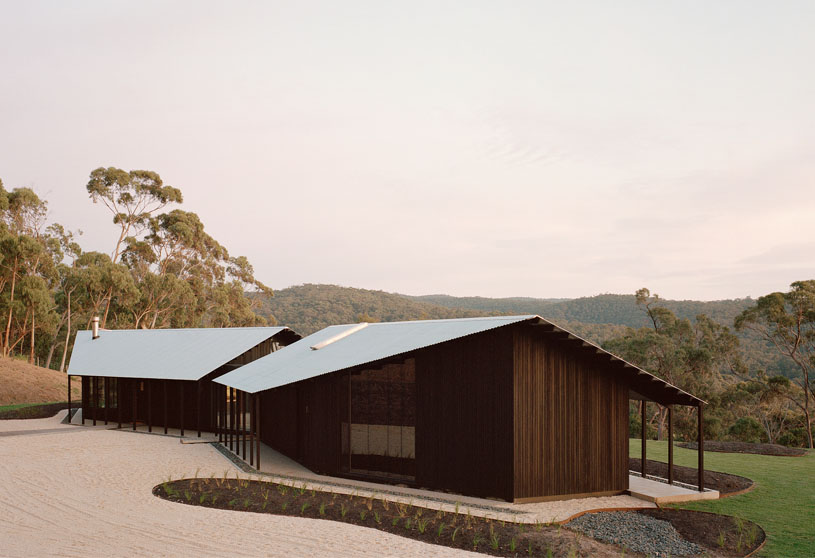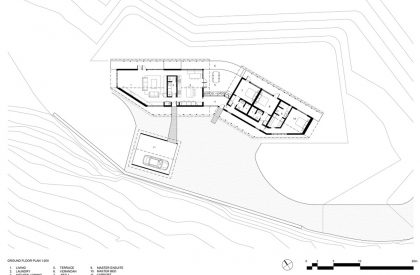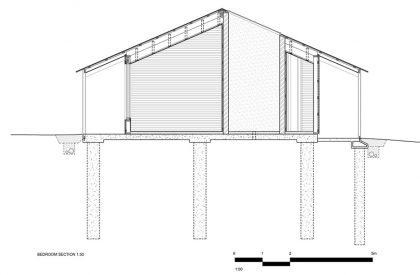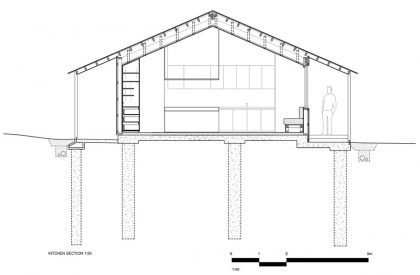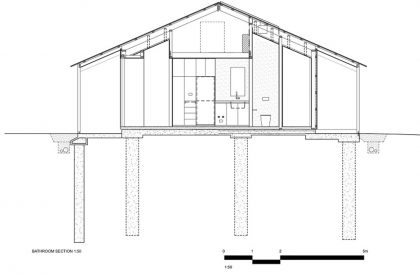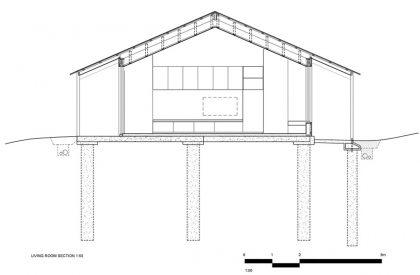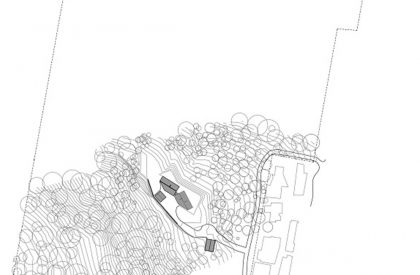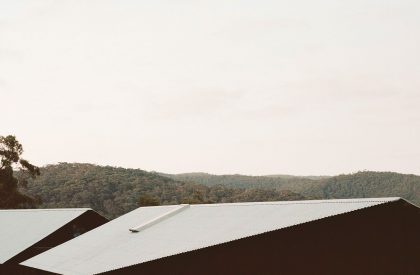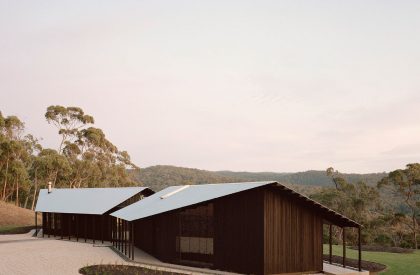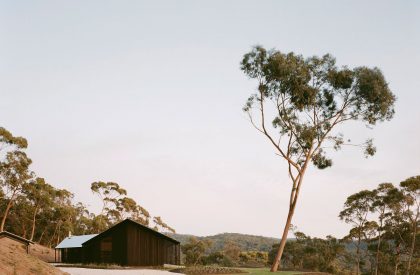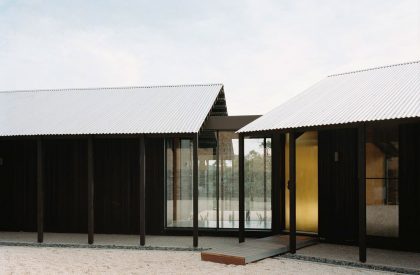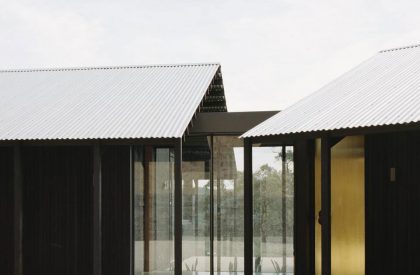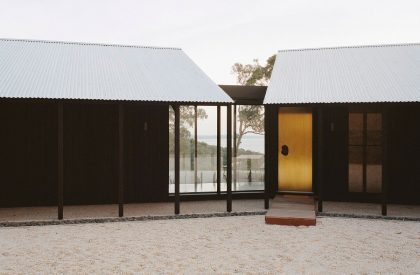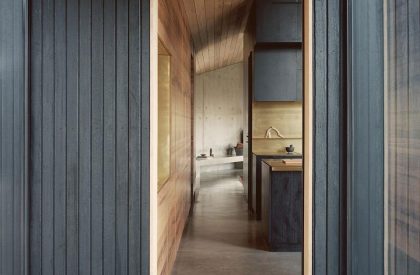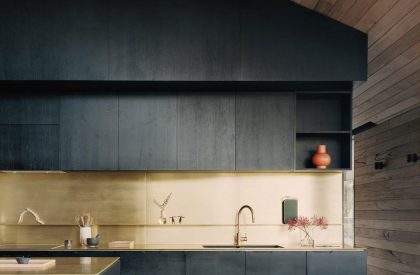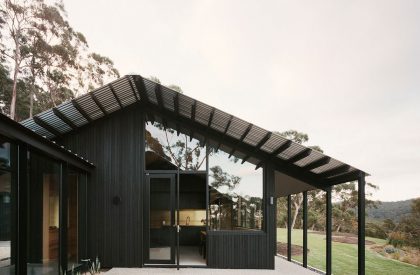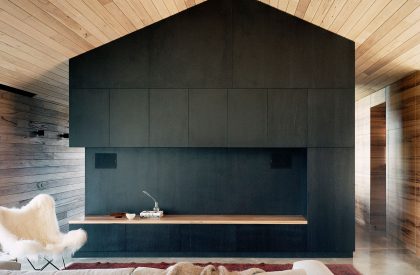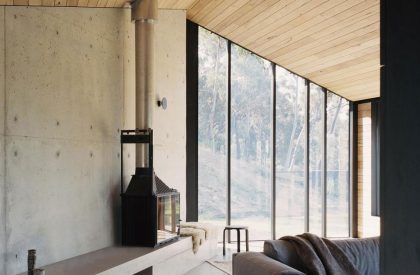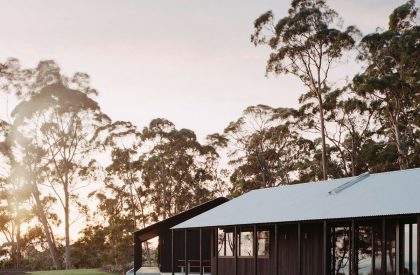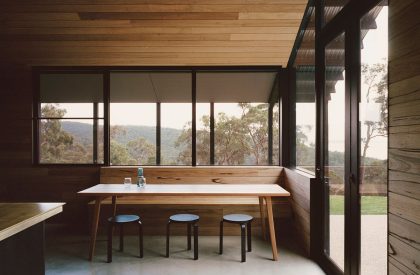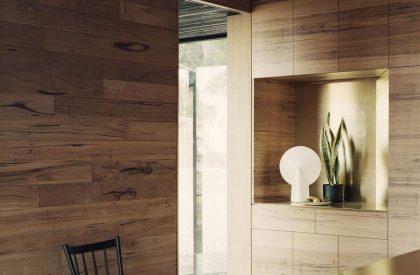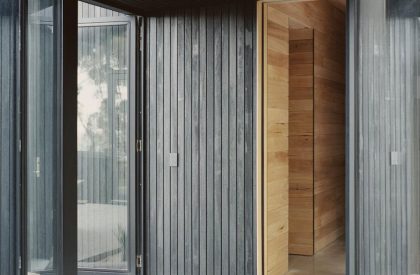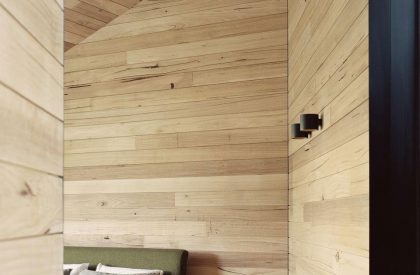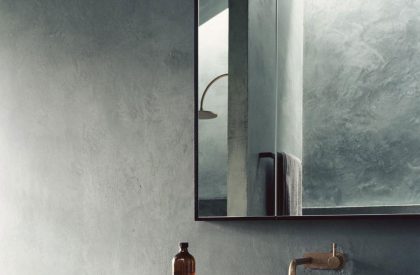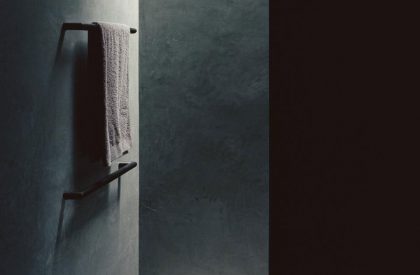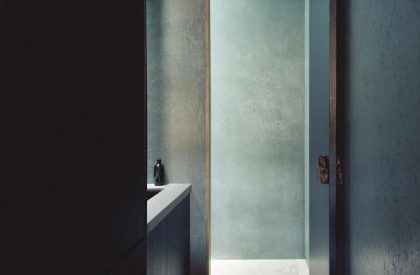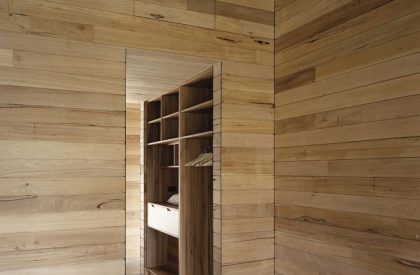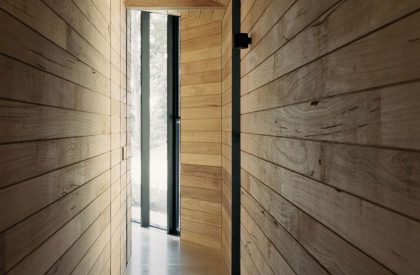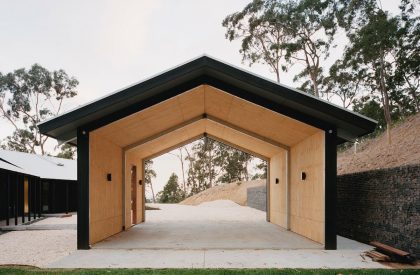Excerpt: Two Sheds, designed by DREAMER, is located on 25 acres of bush in the hills immediately to the west of the Lorne township, Victoria, Australia. The project uses a minimal material palette and a simple design language drawing from local cottages, agricultural buildings and Australian vernacular.
Project Description
[Text as submitted by the Architects] Two Sheds is located on 25 acres of bush in the hills immediately to the west of the Lorne township, Victoria, Australia. It is a retreat allowing the clients to disconnect from the world of city, noise, and work as they come together to reconnect and begin a 30-year project to rejuvenate the surrounding bushland. The project uses a minimal material palette and a simple design language drawing from local cottages, agricultural buildings and Australian vernacular. It provides a backdrop for cherished family experiences as the inhabitants slow down, notice and engage with the simple joys of living.
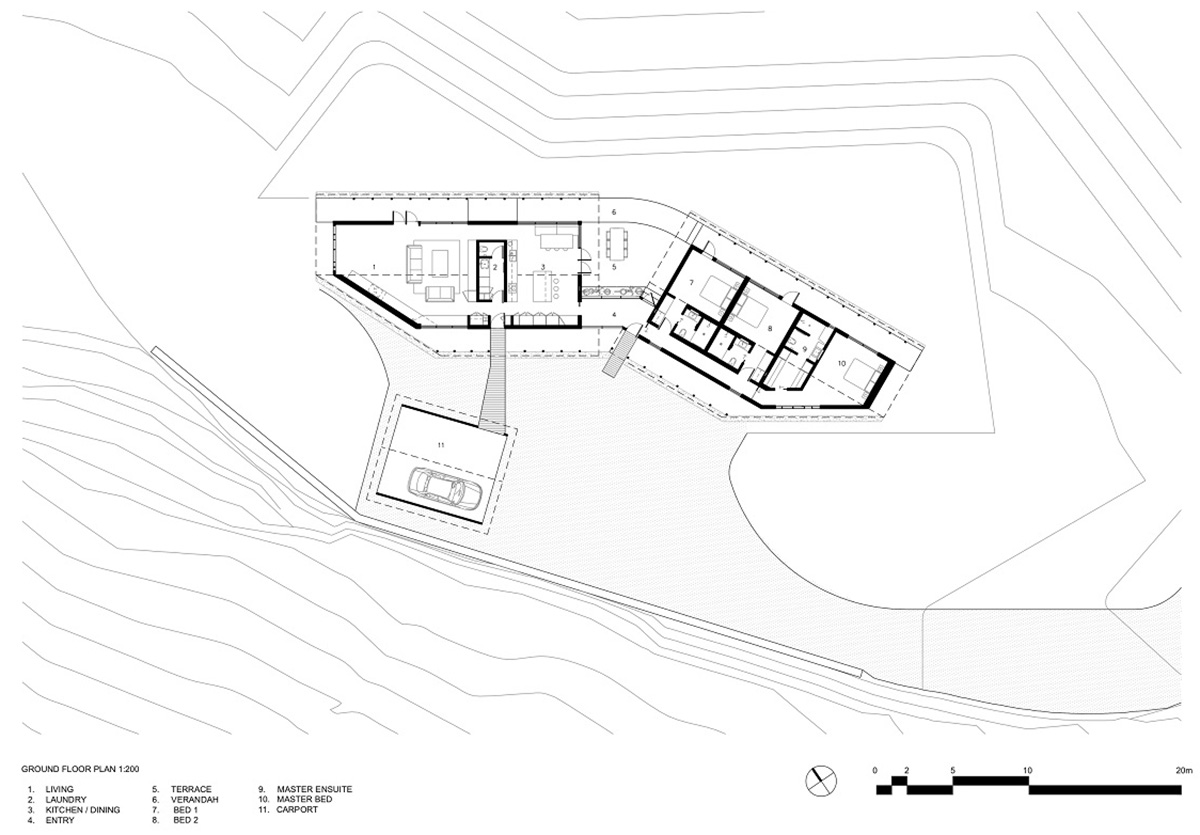
History
The site was purchased by Roger and Jane Nelson in 2010. Roger is Managing Director of NH Architecture and over the course of the next 7 years, he and Jane designed a house and obtained a planning permit for the site. This process was time-consuming and difficult as the site had a bush fire management overlay and required an assessment and management plan to establish the required BAL rating and consequent defendable space.
Research / Discovery
We undertook a number of meetings and design workshops at the client’s Melbourne home, hearing about the project and slowly understanding how they liked to live. A number of times we walked around their home, discussed and observed the design of various elements from sliding doors, to light switches to fans.
We spoke at length about other buildings they had visited that contributed meaningfully to their lives, particularly important was Louisiana gallery in Denmark. We observed their current lifestyle and love of art. We discussed family life, being active, connecting outdoors. Jane in particular spoke of her desire to rejuvenate the land around the future house in Lorne and re-establish native plants.
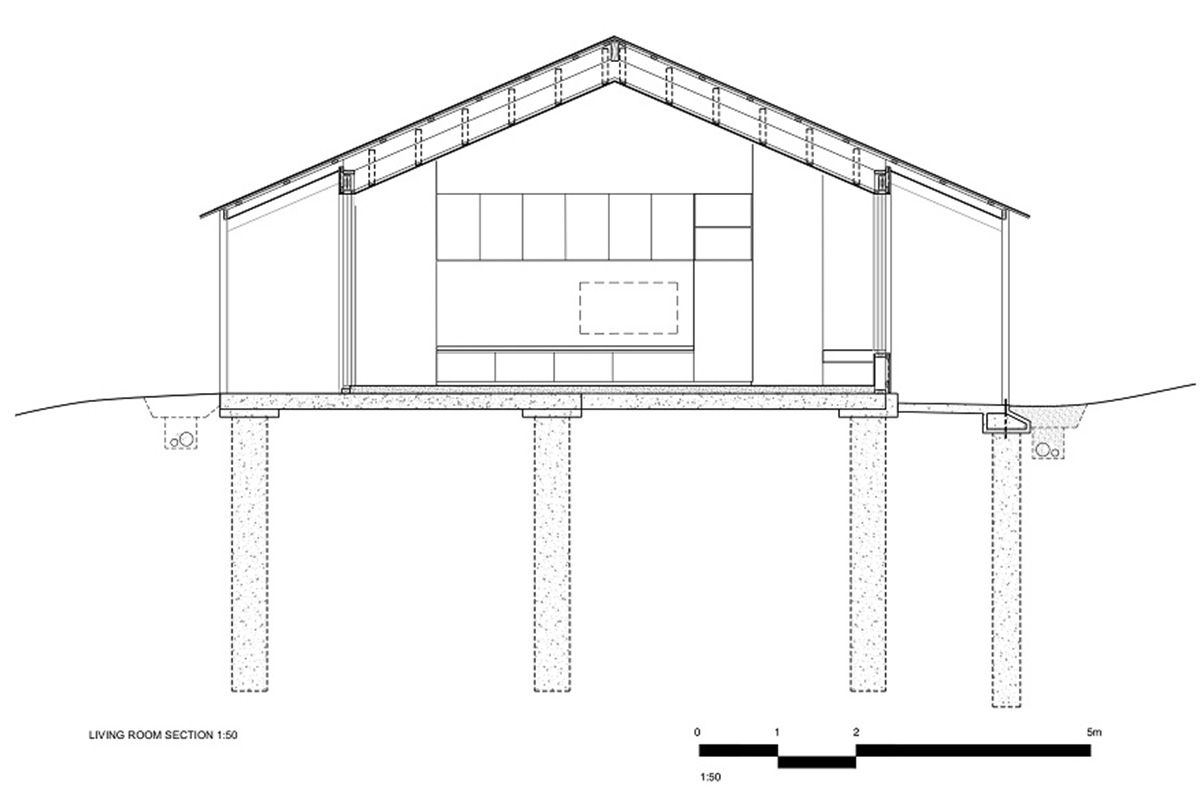
Defining the problem
Through these workshops and discussions, we heard a story about escapism, about working outdoors, about a cottage or shed on a rural property. We asked ourselves and the client what it meant to leave the city on the weekend. This was to be a bush retreat, but more a house to challenge the inhabitants, a house that defines a certain way of living. Physical escapism through being in a different place/experience and but escapism of identity through the different actions and activities not present during the day to day life.

Designing and workshopping
Through this process DREAMER was ultimately engaged to build on the work the nelsons had already started and develop a new concept for the complete house. We began by working with the client to narrow down the key things that the house had to do well and started to jettison what was non-essential.
The crystal-clear zoning between the private sleeping areas and public social spaces was to be retained from the original design and importantly, this house needed to work as well for 2 as for 7 people (and have room to grow with additional grandchildren).
Requirements included places for social interaction and places of quiet reflection, spaces for connecting outdoors, as well as a house that would provide a base from which to work in the bush. The clients Dreamt of walking out onto grassed glades from any room in the house.
We workshopped 3 iterations of the plan, each reducing the footprint in size and helping us to put ourselves and the client in the space. The client contributed a beautiful axonometric sketch that helped to solidify the form of the project. The original design had been a much larger home of 500+sqm with the new concept a more compact 220sqm.

The Building
Views to the hills and beach, privacy and constructability had all been carefully balanced in siting of the previous design. In addition, the clients and design team wanted to avoid any further time spent in town planning and the original location was kept.
Two almost identical but mirrored gable-roofed timber-lined sheds, compose the public and private zones of the house, with the timber externally charred and raw within. The forms are separate but remain connected internally via a glazed gallery and externally via a terrace and path. They align with existing contours and are consequently cranked to face away from each other, increasing privacy to sleeping sheds and bedrooms.

Verandas line the hill and ocean sides of the buildings, mediating the sun and providing a deep threshold, from inside to out. Importantly these have also become great informal social spaces for a drink and chat. The verandas expressed rafters and roof eaves are reminiscent of Australian typologies such as the cottage and shed and similar elements are can be found on buildings nearby.
Internal
The social/living shed to the west is an open space occupied by a dark central box housing the kitchen, laundry, WC and living joinery. This box creates two volumes at either end of the shed forming the kitchen/meals areas and living/lounge. These are distinct spaces but still connected. Conversely, the sleeping shed is divided repeatedly, creating compact bedroom and bathroom spaces, connected via a corridor to the south. A concrete wall in the living space necessary for bracing became an opportunity for a long shelf/seat and spot for a wood heater.


In the sleeping quarters the zoning, seamless sliding and pivot doors and increased acoustic control through timber-clad blockwork walls all work hard to create intimate, quiet spaces, secluded but still connected to bush and ocean. The bathrooms are intentionally located within the building, with low ceilings that release into full height shower spaces, lit by skylights. They are experientially different to the rest of the house as the soft light and cementitious render highlight the timber materiality present elsewhere.
A loose court is present on the hillside of the house, created by the retaining wall, main house and carport/future bungalow. This space has been left open to change as the family’s needs grow in the future.

BAL and Sustainability
The very real risk of bushfire in the area and the local Bushfire Management Overlay posed additional challenges for both the siting with the necessity of sufficient defendable space surrounding the house and detailing for bushfire resistance.
Two Sheds was Built to withstand BAL (bushfire attack level) 29 and is an example of the design possibilities with careful consideration of bush fire resistance design standards. This included the choice of timber used externally, the way roof penetrations function, the type of glass chosen for windows and how vegetation works in close proximity to the house. Above and beyond the standards, a gutter-less roofing design was implemented to reduce fire danger through ember attacks. In addition, the siting of the house was key in ensuring adequate defendable space was present.
The tough climate also required that Two Sheds perform very well thermally with both very cold and hot days possible during the year. The gable roof design allowed for high performing R7 insulation and deep walls allowing for R4.5 insulation. The verandas and eaves also protect the walls from sunshine for most of the day and the client has reported it works extremely well.

The Final Outcome
Two Sheds is a house of elegant simplicity and imperfect loveliness. The reductive approach taken during the design process minimised the number of materials and highlighted the pared-back, familiar design. This allowed us to create a series of special moments; whether parking the car, entering the building, putting your bags down, cooking dinner or reading a book. This simplicity of the project meant the focus was the creation of beautiful space rather than on a perfect example of architecture. The result is a house that is calm, flexible, and with opportunities for family connection and ease of working in the landscape and nearby bush.

The spaces within Two Sheds were driven by a design process that championed function, site and client brief rather than beauty as an end in itself. The simple roof, veranda and cladding allow the building to sit easily in the landscape within the magical backdrop of the surrounding bush and hills. There is a timeless feeling to Two Sheds, and we look forward to watching how the brass and timber develop their own personalities as they age over time.
This project has changed the lives of the inhabitants. There has been a number of emails and phone calls from the clients that described the delight in their reconnection to changing bush through seasons, kangaroos passing by in the late afternoon and the course of sunlight through windows during the day.

It is also a homage to the craftsmanship and passion for the true values of “making” buildings. The intentions of the design were truly realized by exceptional skills and perception of key people and indeed craftsmen in the builder’s team that really ‘loved “the building into existence. Much is owed to this commitment to making great things
Two Sheds is a project that helps to define what a regionally appropriate Australian architecture can look like. It is a contemporary project, but with its gable roof form and veranda, its lineage harks back to classic Australian cottages, sheds and cabins. These icons of the rural built form and associated design elements are important to Australian culture. A design methodology that looks to the past in the creation of Australian rural housing may hold the key to ensuring successful buildings that connect to the landscape, are climate-appropriate and flexible to future change.
